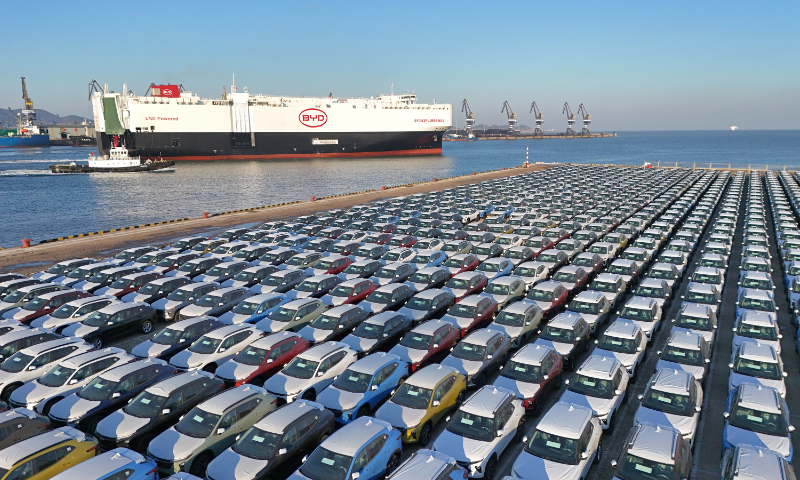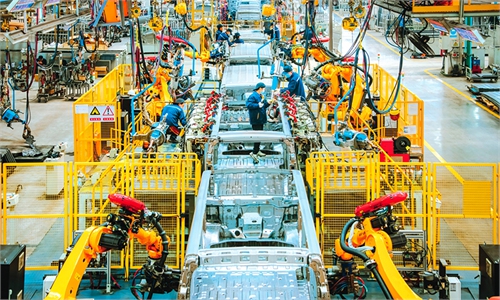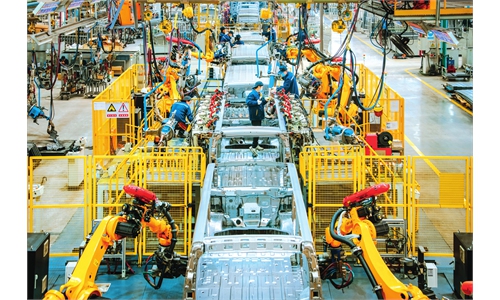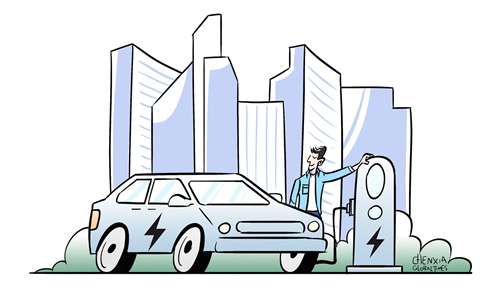
BYD Explorer No.1 roll-on/roll-off ship, BYD Co's first chartered cargo ship for exports of electric vehicles, leaves a berth at Yantai Port in East China's Shandong Province, on January 9, 2024. The ship is destined for ports of Vlissingen in the Netherlands and Bremerhaven in Germany. Photo: VCG
Chinese carmaker BYD said it will invest more to help expand new-energy vehicle (NEV) exports via sea shipping, with seven new roll-on/roll-off (ro-ro) ships - for wheeled cargo transport - expected to begin operating in the next two years, Wang Chuanfu, chairman and president of BYD, said on Sunday.
As more Chinese electric vehicle (EV) brands are going abroad, BYD started the ro-ro ship transport business to increase transport capacity, Wang said, noting that seven more ro-ro ships will be put into operation over the next two years.
BYD started using purpose-built EV cargo ships to send its cars to Europe from the beginning of 2024.
The carmaker's first chartered cargo ship, BYD Explorer No 1, with room for 7,000 cars, set sail from the Xiaomo International Logistics Port in Shenzhen, South China's Guangdong Province on January 15, destined for the ports of Vlissingen in the Netherlands and Bremerhaven in Germany, according to a statement sent from BYD to the Global Times.
Other carmakers have developed their own ro-ro ships for vehicle exports. In late January, SAIC Motor's first ocean-going car carrier departed from Xiamen, East China's Fujian Province, carrying 3,700 domestically made cars, including 1,700 NEVs.
Ro-ro ships are specifically designed to ferry vehicles to distant markets, with the advantages of fast loading and high transportation quality. The increase of ro-ro ships has showcased the nation's newfound strength in the emerging field of vehicle exports, Wu Shuocheng, a veteran automobile analyst, told the Global Times on Sunday.
In 2023, China's exports of NEVs reached 1.2 million units, surging 77.6 percent year-on-year, according to data from the China Passenger Car Association (CPCA).
Exports of NEVs have maintained a robust growth trend in 2024, with 95,000 cars shipped in January, up 27.1 percent year-on-year, according to the CPCA.
The momentum is likely to persist and push China's auto industry to enter a new era of "independent and fast shipping," Wu said.
The NEV industry has become a model of high-quality development in China in recent years, having demonstrated remarkable resilience.
According to Wang, there will be three major development opportunities in the NEV sector: deepening of vehicle electrification, the rise of Chinese high-end automotive brands and expanding export demand.
Wang made the address during the Guangdong Provincial High-Quality Development Conference held in Shenzhen on Sunday. In the aftermath of the Chinese Spring Festival, the conference emerged as a testament to Guangdong's relentless pursuit of high-quality economic development.
Wang said the achievement made by BYD reflected the commitments of favorable policies from local governments that insisted on developing the manufacturing industry, and accelerating the development of new productive forces.
"Without the strong support from Guangdong Province and Shenzhen city, BYD would not be what it is today," Wang said.



